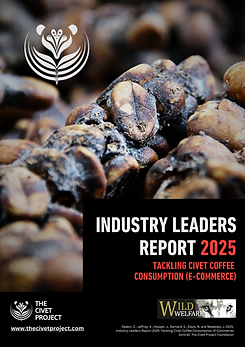

Civet Coffee Industry Investigations

We explored the marketing and sale of civet coffee on e-commerce platforms Amazon, Etsy and eBay. Our report highlights widespread sale of civet coffee, platform policy breaches and false advertisements including fraudulent claims of wild collection and animal welfare assurances.
We're calling for Amazon, Etsy and eBay to ban the sale of civet coffee on their platforms, to protect civets and consumers alike.
Add your name:

We investigated the advertisement and sale of civet coffee tourist experiences. Our report has resulted in leading tourism operators withdrawing the sale of civet coffee experiences from their platforms.
We won't stop there. We're calling on the UK Government to make the sale of civet coffee attractions illegal to protect the interests of animals and UK consumers.
Write to your MP:
Captive Welfare Guides

Asian palm civet
Civets benefit from a varied diet and a stimulating, complex environment with opportunities for climbing, thermoregulation and nocturnal activities.
Although the Asian Palm Civet is classed as least concern by the IUCN, they face significant threat from the civet coffee industry, luxury meat trade, indiscriminate snaring, the pet trade, and human-civet conflict. More and more civets come into sanctuaries every year, and this guide is designed to assist care-givers in their ability to meet optimal civet welfare standards.
The palm civet is now being recognised by the IUCN as three distinct species and this guide should be applicable to all of them.

